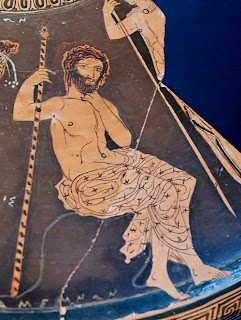If Homer had told the tale of Troy in a linear way, the following passage might have been very near the opening of his poem. It's the descent of the kings of Troy from Dardanus down to Priam. But in fact it comes in Book 20.213 ff, quite near the climactic and decisive fight between Achilles and Hektor.
The passage evokes the blessed, proud and happy beginnings of the city sacred to the gods:
The other remarkable thing here is that Aeneas isn't speaking to a friend or god or ally. He's speaking to Achilles. The gods have arranged for these two warriors to meet in battle, and the recital of forebears will precede the clash of arms.
After some more words, the two fighters are at the striking point when Poseidon turns to the other gods, explains that Troy has earned Zeus's hate, and foretells the fate of Aeneas:
"Howbeit, if thou wilt, hear this also, that thou mayest know well my lineage, and many there be that know it: at the first Zeus, the cloud-gatherer, begat Dardanus, and he founded Dardania, for not yet was sacred Ilios builded in the plain to be a city of mortal men, but they still dwelt upon the slopes of many-fountained Ida. And Dardanus in turn begat a son, king Erichthonius, [220] who became richest of mortal men.And of course the horses of Troy have pride of place:
Three thousand steeds had he that pastured in the marsh-land; mares were they. rejoicing in their tender foals. Of these as they grazed the North Wind became enamoured, and he likened himself to a dark-maned stallion and covered them; and they conceived, and bare twelve fillies. These, when they bounded over the earth, the giver of grain, would course over the topmost ears of ripened corn and break them not, and whenso they bounded over the broad back of the sea, would course over the topmost breakers of the hoary brine. And Erichthonius begat Tros to be king among the Trojans, and from Tros again three peerless sons were born, Ilus, and Assaracus, and godlike Ganymedes that was born the fairest of mortal men; wherefore the gods caught him up on high to be cupbearer to Zeus by reason of his beauty, that he might dwell with the immortals. And Ilus again begat a son, peerless Laomedon, and Laomedon begat Tithonus and Priam and Clytius, and Hicetaon, scion of Ares.
Two remarkable aspects of this recounting of the lineage must be noted. The first is that the speaker of these lines is not Homer, but Aeneas, who now places himself within that genealogy:
And Assaracus begat Capys, and he Anchises; but Anchises begat me and Priam goodly Hector. This then is the lineage amid the blood wherefrom I avow me sprung.At the very point at which the fate of the city hangs by a thread, Aeneas, whom Homer knew would survive, is recapitulating his origins and descent as well as those of all the children of Priam.
The other remarkable thing here is that Aeneas isn't speaking to a friend or god or ally. He's speaking to Achilles. The gods have arranged for these two warriors to meet in battle, and the recital of forebears will precede the clash of arms.
After some more words, the two fighters are at the striking point when Poseidon turns to the other gods, explains that Troy has earned Zeus's hate, and foretells the fate of Aeneas:
And forthwith he [Poseidon] spake among the immortal gods, saying: "Now look you, verily have I grief for great-hearted Aeneas, who anon shall go down to the house of Hades, slain by the son of Peleus, for that he listened to the bidding of Apollo that smiteth afar—fool that he was! nor will the god in any wise ward from him woeful destruction. But wherefore should he, a guiltless man, suffer woes vainly by reason of sorrows that are not his own?—whereas he ever giveth acceptable gifts to the gods that hold broad heaven. Nay, come, let us head him forth from out of death, lest the son of Cronos be anywise wroth, if so be Achilles slay him; for it is ordained unto him to escape, that the race of Dardanus perish not without seed and be seen no more—of Dardanus whom the son of Cronos loved above all the children born to him from mortal women. For at length hath the son of Cronos come to hate the race of Priam; and now verily shall the mighty Aeneas be king among the Trojans, and his sons' sons that shall be born in days to come." Iliad 20.292 ffThe entire family tree from Dardanus (actually, before him was Teucer) to Romulus and Remus is here. When the entire lineage is put together, the "linear" tale leads directly from Teucer to Rome. In rescuing Aeneas from the anger of Achilles, Homer's Poseidon is opening the way to Virgil's Aeneas and a new sacred city, the Imperium Romanum.
 |
| Rome 100 AD |





